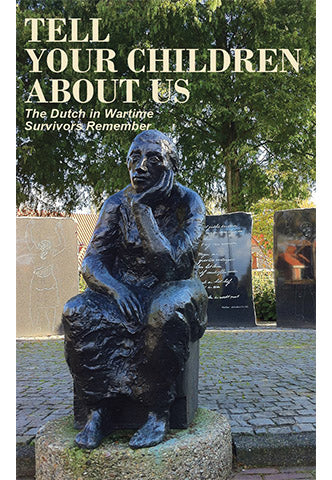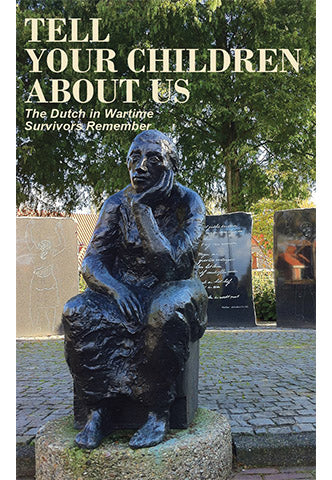Dutch the store
Tell your children about us
Couldn't load pickup availability
The Dutch in Wartime: Survivors Remember is a series of books with wartime memories of Dutch immigrants to North America, who survived the Nazi occupation of The Netherlands.
Book 5: Tell your children about us, covers the years of 1943 and 1944, when the struggle to simply survive had become raw and harsh. Food, fuel and clothing were in very short supply and Nazi oppression endangered every citizen's life, every day.
Designed and written to be easily accessible to readers of all ages and backgrounds, these books contain important stories about the devastating effects of war and occupation on a civilian population.
Edited by Anne van Arragon Hutten.
104 pages
Historical background, map and 37 wartime memories.
ISBN: 978-0-3968308-6-0
On the cover: ‘Contemplation Monument’, created by Marius van Beek to remind the citizens of Amsterdam of the casualties of war and of regained freedom and peace. (Photo: Sanne Terpstra)
READ AN EXCERPT
One of the chores was standing in line
When war broke out, our family lived in a small town not far from The Hague and Leiden, where my father was stationed in the Dutch army. By September of 1944 we lived with my grandmother in a big house near Arnhem. It had seemed safer to move there from the western part of the country, closer to the farms and food supply. That month was the big attempt by the Allied forces to conquer Arnhem, which lies on the Rhine River. From our kitchen window we watched hundreds of parachutists coming down. Even though a big battle lay ahead, we anticipated liberation in a few days.
However, it was not to be, and everyone was immensely disappointed. The Germans were not giving up; Arnhem was practically destroyed and its people had been evacuated right before the start of the fighting. Our house was filled with evacuees, relatives from Arnhem. Soon, however, the Germans ordered everyone to leave town, except for my other grandmother who was allowed to stay because of her age. It was a desolate sight to see them leave, parents walking with small children and few belongings. Where would they find a place to stay?
After the disappointment of the failed liberation attempt, followed by the separation from our relatives, a feeling of desolation set in. The household chores of day to day living kept everyone busy. All schools were closed now, but after some time about ten or twelve children were given daily lessons in preparation for the eventual return to school, which for us was going to be in the seventh Grade. We met in a room at the local gas factory at first, then in the garage of the doctor whose son was in our class. It was fortunate that the teacher was willing to do this, although the parents probably paid him in food or cash.
Now and then our village was attacked by projectiles shot from tanks. My father had instructed me on how to protect myself. “When you hear the boom, boom, boom in the distance”, he said, “you have to listen to the direction of the sound, so that if the building gets hit, the wall will protect you instead of falling on you.”
Sure enough, one day while walking to the gas factory for our classes, I heard the dreaded boom, boom, boom sound, like distant thunder. Quickly I ran to the other side of the street, lying down flat on the ground against the wall of a big building. More children and adults came and did the same thing. We were scared, but the bombs did not fall in that street but a couple of blocks away. Meanwhile I had to move over to make room for others, until I was almost with my nose in a dog’s droppings.
One of the chores in those days was standing in line for bread or milk. The milk by then was very thin and bluish looking. Everyone came with his own container. Sometimes after standing in line for a long time, the milk supply would have run out by the time our turn came. I remember one time very clearly. My mother was pregnant and sent me to go for milk. Everyone waited patiently and made small talk. Suddenly the storekeeper announced, “Anyone who is pregnant may come to the head of the line.” Immediately I went to the front, and the whole line of people roared with laughter. Here was this eleven-year-old trying to get ahead of them! All I could do was mumble that it was my mother who was pregnant. I had to go back to my place in line.
Lisette de Groot
Asheville, North Carolina

